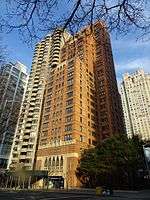Kent Automatic Garages
Kent Automatic Garages were popular in a number of metropolitan areas from the late 1920s through the early 1960s.[1] They enabled customers to park their cars for an hour or longer with a standard rate of $.50 per hour for the first two hours, and $.05 for each additional hour or fraction thereof, for a twenty-four-hour period. One of the first Kent Automatic Garages was at 44th Street, just east of 3rd Avenue and the other a block west of Columbus Circle.

The parking facilities were convenient, beginning with electric automatic parkers which received vehicles. Autos could be stored and returned to patrons at a moment's notice.[2] Specifically, cars were handled by an electric parker, a small rubber- tired machine which ran beneath the auto and engaged with the rear axle by means of a rubber-cleated coupler. The parker required approximately fifteen seconds to move sixty feet from an elevator, lift the car, and return with it. It saved time by bringing a car from its parking space and returning it to the ground floor, without starting the motor. The auto rolled on its own wheels but was moved by the parker.
Business chronology
Kent Automatic Garages were financed by the Kent Garage Investing Corporation of New York City.[3]
In 1928 the Packard Motor Company sold a plot 100 by 140 feet (30 by 43 m) on the corner of Ninth Avenue which was made into a twenty-five story Kent Automatic Garage at the northeast corner of Ninth Avenue and 61st Street. The building was a likeness of the Kent Grand Central Station Garage. The land adjoined the Packard showrooms and sold for $600,000. The garage held 1,000 cars.[4]
By December 1930 had erected a twenty-eight story garage on Quincy Street in Chicago, Illinois, with space for 1,200 cars. The Wabash-Harrison Garage was built in connection with the $15,000,000 Carew Tower in Cincinnati, Ohio. This included a combination 650-room hotel and a 750-car Kent garage. Contracts for equipment and the erection of a $2,000,000 parking garage in Philadelphia, Pennsylvania, had been signed.[1]
The Kent Automatic Garage at 209 - 211 East 43rd Street through to 208 - 210 East 44th Street was sold in a foreclosure sale by Joseph P. Day, on November 13, 1931. The property brought $60,000 above liens which totaled $700,000. The plaintiff, Fred T. Ley & Co., was the purchaser.[5]
Decline following World War II
The post–World War II economic expansion brought many large autos which cut the capacity of the garages in half. One East Side (Manhattan) garage became an office building in 1964. The twenty-five story block-through facility at 211 East 43rd Street, east of 3rd Avenue, opened as a Kent Garage in 1928. It had three entirely automatic elevators and space for eight hundred pre-World War II smaller cars. Louis C. Kay bought the property in 1960. He reduced it to a shell of brick walls and a steel framework. It was converted into a modern office building with a seven-story extension which had a glazed facade. The extension possessed a lobby and additional office space.[6] 40°45′5″N 73°58′23″W
See also
References
- Kent Garage Investing Corps, Wall Street Journal, December 27, 1930, pg. 4.
- Display Ad26 - No Title, New York Times, April 15, 1930, pg. 4.
- 24-Story Garage Open; Parking Is Automatic, New York Times, February 22, 1929, pg. 21.
- Ninth Av. Corner Is Sold For A 25-Story Kent Garage, New York Times, November 1, 1928, pg. 52.
- Kent Garage Sold At Auction, Wall Street Journal, November 14, 1931, pg. 13.
- East Side Garage Starts a New Life As Office Building, New York Times, March 29, 1964, pg. R3.